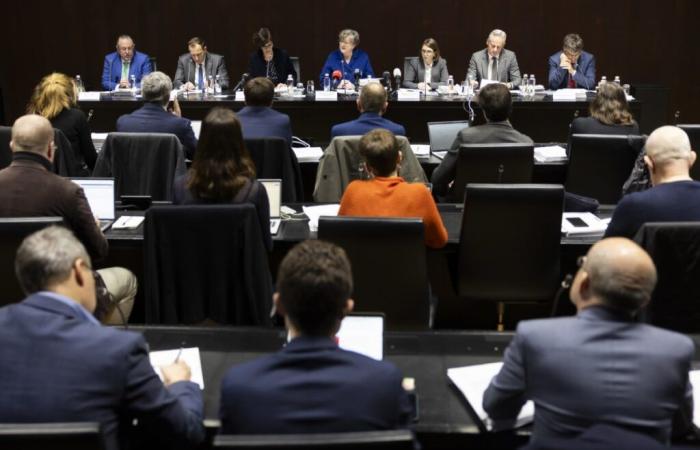Interest in the ICC report was great.
Keystone / Peter Klaunzer
The parliamentary commission of inquiry published its conclusions on Friday on the matter that led to the collapse of Credit Suisse and its acquisition by UBS.
This content was published on
December 20, 2024 – 2.28pm
Responsibility for the crisis that engulfed what was the second most important bank in Switzerland can be attributed first of all to the management of Credit Suisse (CS), which for years demonstrated “mismanagement”, causing a “loss of confidence” in institute and leading it into a situation that “puts its existence in jeopardy in March 2023”.
This is what the Parliamentary Commission of Inquiry (CPI) underlines on Friday, which presented its drafted report to the attention of the federal parliament.
The ICC found “no fault attributable to the authorities in the CS crisis”, who with their intervention “managed to prevent a global financial crisis”.
Analyzed over 30,000 pages of documents and listened to 79 people
Parliamentary commissions of inquiry are extremely rare in Switzerland. The one created to shed light on the Credit Suisse collapse was only the fifth in history.
+ If you want to know more about the other four CPIs established in the past you can consult this article.
The ICC was made up of 14 parliamentarians (seven from each chamber) from all the main political forces.
In the last 18 months it has held 45 meetings, during which it listened to 79 people and analyzed over 30,000 pages of documents.
Its final report, of over 500 pages, will be examined by the Chambers in the spring session of 2025.
Deficiencies at all levels
However, stated the president of the ICC, the Councilor to the States of the Center Isabelle Chassot, shortcomings were noted at all levels.
The supervisory activity of FINMA (the Federal Financial Market Supervisory Authority) “was only limitedly effective”, despite numerous warning signals, we read in the press releaseExternal link of the ICC.
>> The news report:
The commission deplores in particular the fact that FINMA did not revoke the bank's guarantee of irreproachability and that it actually granted it relief in terms of its own funds. Although legal, the measure proved to be inadequate and hid the real financial situation of the institute, observed the national councilor of the centrist Democratic Union Thomas Matter, one of the 14 parliamentarians who were members of the commission. “Its impact – we read again in the note – was much more incisive than expected and, without its application, the prudential requirements regarding own funds would not have been fulfilled by CS in a slight way as early as 2021 and in a clear way from 2022”.
According to the CPI, urgent action is needed regarding the granting of relief to systemically important banks.
The CPI also criticizes the fact that the legislation relating to “too big to fail” banks has been developed hesitantly and that the circulation of information between authorities has not always been sufficient.
>> In this article we retrace the history of Credit Suisse
Poor communication
The Credit Suisse situation was little discussed between FINMA, the Federal Audit Oversight Authority (FAOA), the Swiss National Bank and the Federal Council. As a result, the authorities involved did not all have the same level of information, the ICC notes.
The first summary information was communicated to the Federal Council as early as August 2022. The former head of the Federal Department of Finance Ueli Maurer was slow to inform the government of the bank's critical situation, said Socialist National Councilor Roger Nordmann. The information was provided only orally. Maurer justified his position with the fear of escapes.
Furthermore, Nordmann said, the change in responsibility within the department (Maurer resigned at the end of 2022 and his post was taken over by Karin Keller-Sutter) did not work as expected.
Isabelle Chassot, however, underlined that it is not the task of the ICC to “indicate whether one federal councilor had more responsibility than another”.
The preliminary work has borne fruit
In its report, the CPI however praises the preliminary work carried out by the authorities to analyze the various alternative scenarios for emerging from the crisis. Already in December 2022, FINMA pushed Credit Suisse to prepare for an emergency sale, namely to UBS.
Despite federal authorities' surprise at the banking crisis in the United States, there was a realistic option available during the acute phase of the crisis in March. Gathered in a crisis cell, the different actors were able to maintain the solvency of Credit Suisse during the few days between March 15 and the takeover by UBS on March 19, thus avoiding a global financial crisis.
One hundred and fifty years of history ended in a flash in March 2022.
Keystone / Ennio Leanza
When the scenario of a merger with UBS emerged, the positions of the two banks in the negotiations were far apart from each other. The authorities played a crucial role as mediators and to some extent replaced the direct dialogue between the two banks, underlined CPI Vice President Green Franziska Ryser.
As negotiations between Credit Suisse and UBS were uncertain, the authorities continued to work in March on several options, including a reorganization, bankruptcy, a short-term takeover by the state or, as a last resort, a forced merger with UBS.
The authorities ensured a balance of interests, but also the financial consequences for the Confederation. Due to the limited time available, the scenario chosen by the Federal Council was the most important, the ICC concluded. An acquisition by a foreign competitor would have been a “preferred” option in the medium term, to avoid ending up with a single large bank in Switzerland. However, this option was discarded due to lack of time.
A catalog of 20 recommendations
The ICC does not limit itself to taking stock of what has happened, but also calls for improvements, making 20 recommendations.
In particular, it proposes to insert the regulation “too big to fail” within an international framework, adopting more effective provisions applicable to systemically important banks.
According to the ICC, the rules for cooperation between the authorities responsible for financial stability in Switzerland also need to be clarified.







